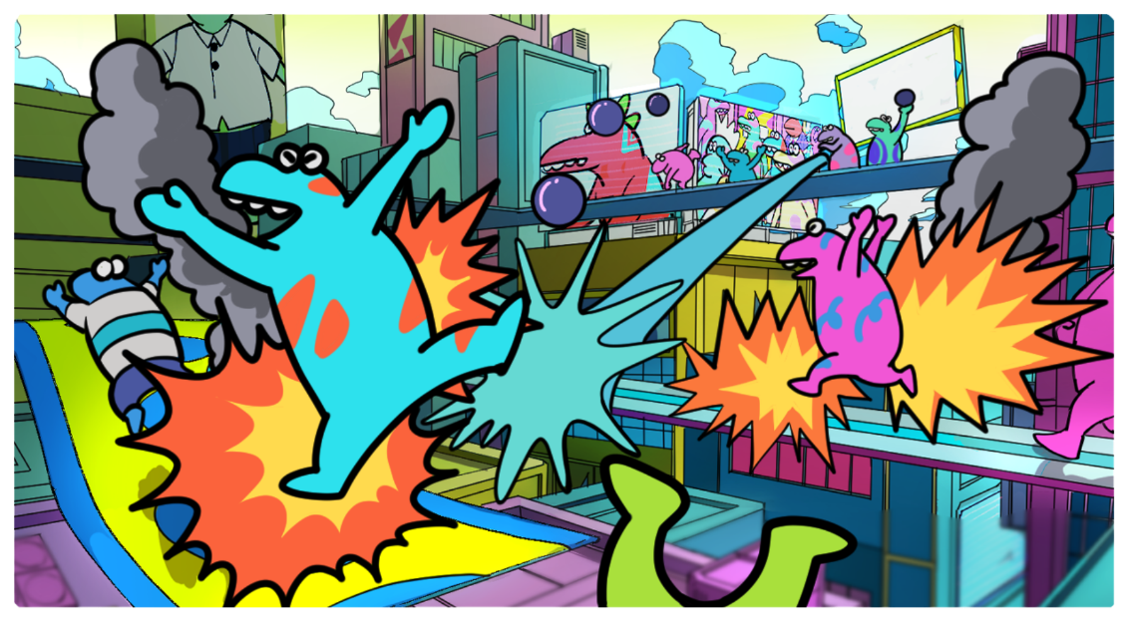
The unique approach to developing this title sets it apart from other games. In Part One, we discussed some of the obstacles the team ran into while making the game into what it is now, as well as the secret story behind the development of the game’s visuals, which was influenced by the aesthetics of the ’80s and ’90s.
In Part Two, we’ll focus on the ingenuity of the sound creation and the growth that comes from experiencing the development of a game from production to release in a short period of time as a small-scale developer.
Participants were interviewed in an online discussion over Zoom. (Held April 2022.)
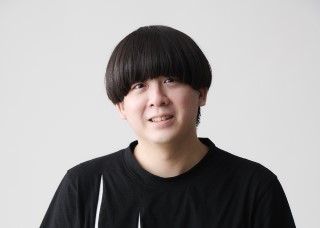
- Yusuke Shigeta
- Producer
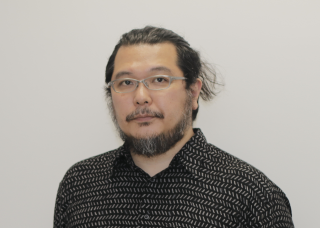
- Makoto Ando
- Art Director

- Yoko Tanaka
- Lead Artist

- Yoshiaki Sawada
- Game Design Director
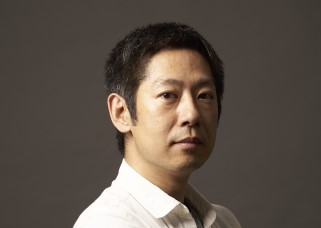
- Yoshihito Yano
- Sound Director
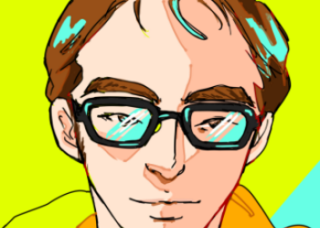
- Koichiro Watanabe
- Chief Technical Director

- Tomokazu Matsumaru
- Technical Director
Sound production using innovative methods such as “Music Production UX Chart” and “4-bar Tone Check”
――――How did you go about creating the sound for this project?
●Yano: We devised methods called “Music Production UX Chart” and “4-bar Tone Check”.
“Music Production UX Chart” is a technique that uses a chart to describe the flow of emotions by expressing the user’s level of excitement on a 10-point scale. It was easy to communicate to the composers, and we were able to have them create music that was close to what we wanted from the first draft.
The first step is to compose only the four bars of the beginning of the song, which is where the “4-bar Tone Check” comes in. This saved us from having to ask the composer to rework the entire piece if the vibes weren’t what we were looking for. That kind of “table-flipping redo” can cause the composers to become skeptical and break down the trust between the parties.
In addition, as a sound director, I tried not to express my opinions too strongly. I would first communicate the appealing points of the music that was created, and then work together with the composers to come up with ideas to improve them. Thanks to this, we were able to create a co-creative relationship where even newcomers in their first to third years with the company were able to actively express their opinions. The approach of creating a development team motto was also effective in understanding their culture and building trust among the team members.

―― Those who are in the position to “flip the table” tend to chalk it up to grit and dismiss it as something unavoidable in their course of work. Even when it comes to trust, they tend to expect the other person to trust them unconditionally.
●Yano: Grit doesn’t last long. Just like how athletes have to pace themselves, I think it’s important to pace yourself well in game development. Grit is like an ultimate ability that you use in the final stages of development or when there are major specification changes, where you need really to focus your efforts on one certain thing.
――What actions do you take as the director when someone doesn’t fit the “4-bar Tone Check” approach?
●Yano: For example, if they prefer to make a full-length song from the get-go, we will adhere to their wishes. It is important for me to have multiple means to proceed towards the goal in my hand, and to use them according to the person I’m working with. I put importance in having the creators exercise their creativity as we accomplish our goal pleasantly.
A modern approach: capturing user response directly from gameplay streams
――The official release was in March 2022. Have you noticed anything since the launch of the game?
●Shigeta: More streamers picked up the game than I expected, which surprised me. However, I feel that stream viewership has not actually led to an increase in players.
●Sawada: The Survival Quiz CITY Steam (*1) page views as well as the amount of people who wishlisted the game were greater than expected, but I got the impression that there was still some way to go before people actually picked up the game. I also think we could have done better with our overseas marketing efforts.
●Watanabe: Lag was also severe when overseas users connected to the Japanese server. We set up overseas servers in an update, but we should’ve kept overseas players in mind from the beginning.
●Matsumaru: While watching streams, we’d realize things that we didn’t before, or people would point out things we had already noticed. Developing with a small team meant that we couldn’t allocate our resources to every part of the game and that was frustrating.
●Yano: Through the volume of comments during streams, we could see what parts of the game led to more responses and when there were few. When there aren’t as many comments being posted, that means that part isn’t as exciting. We use that as a frame of reference for the future, to know where we should add in some additional information or more fun elements.
●Ando: For this game, we designed the screen with streamers in mind, making it easy to stream the game. For example, the streamer’s own character illustrations and computer graphics are often placed in the lower right corner of the screen, so we optimized it in a way where they would be able to play the game even if those parts are covered. Also, we added large on-screen text that the streamer can read out loud to fill in some of the down time during streams.
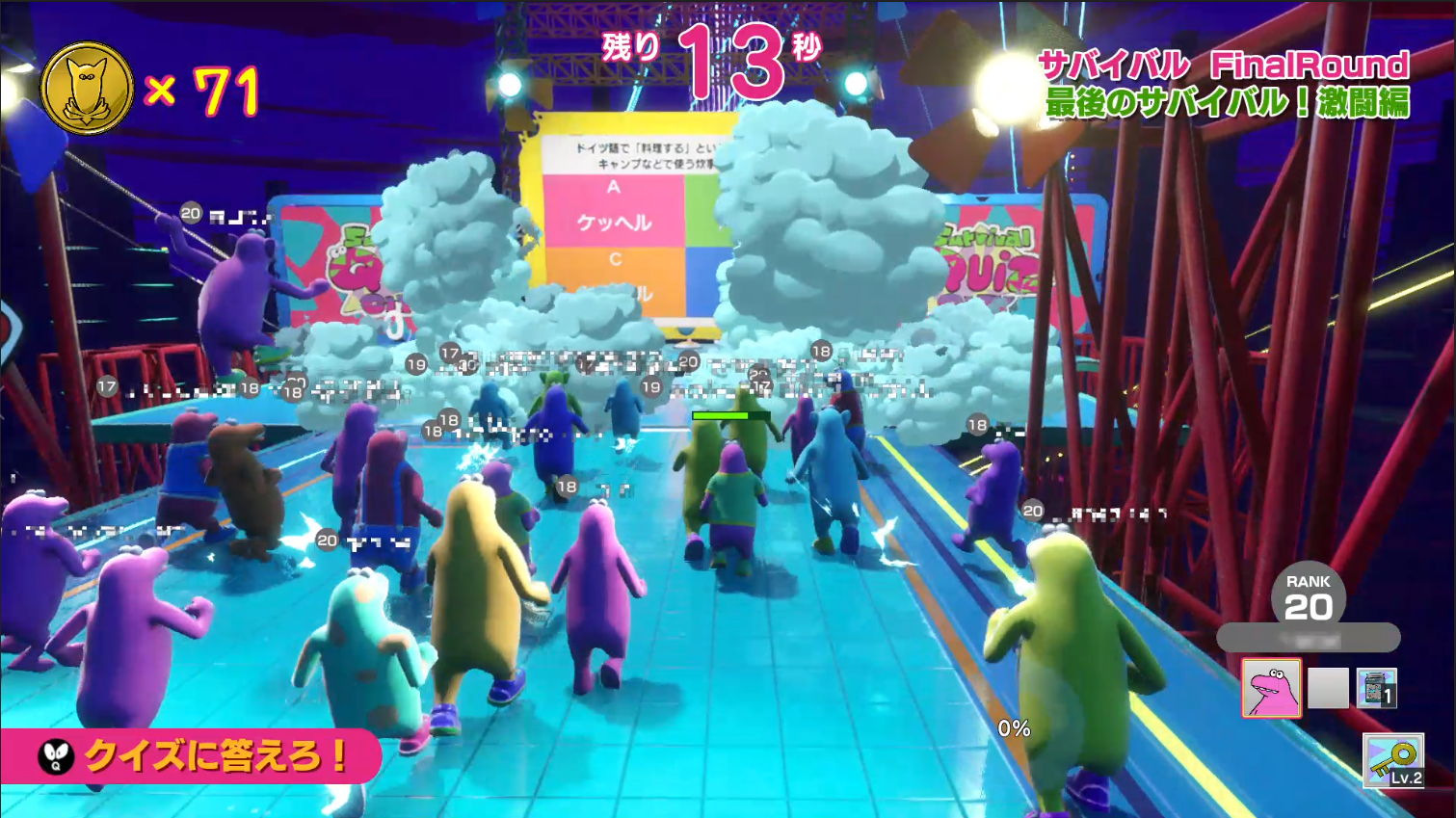
●Tanaka: For the artwork, I was aiming for something that would strongly reel a small range of people in, partly because of my personal tastes. Additionally, I wanted to draw the player’s attention with something that would be eye-catching in terms of color but with little complexity in design, and I think I was able to achieve what I had envisioned.
――Are there any memorable reactions from the players?
●Watanabe: Someone was surprised that a Japanese company can produce a game like this. I think we were able to make some progress by releasing this game at Bandai Namco Studios.
●Ando: I was impressed that the streamer yelled when he won. It’s not every day that you yell from a game.
●Matsumaru: With other games, we could only see the players’ reaction after the game was released. However, during the production of Survival Quiz CITY, we had tests that players participated in. We received a variety of helpful feedback, and it was very motivating to feel the expectation from the players.
●Ando: We conducted play testing for a longer period of time than any other game even within the company. Normally, we would proceed according to our development schedule, but we reworked the game many times to brush it up, get feedback, and make corrections. It was actually a lot of fun.
●Yano: The song titles were displayed in the game, so streamers would say “I like the song ________!” I was happy that it made it easier to get feedback on the music.
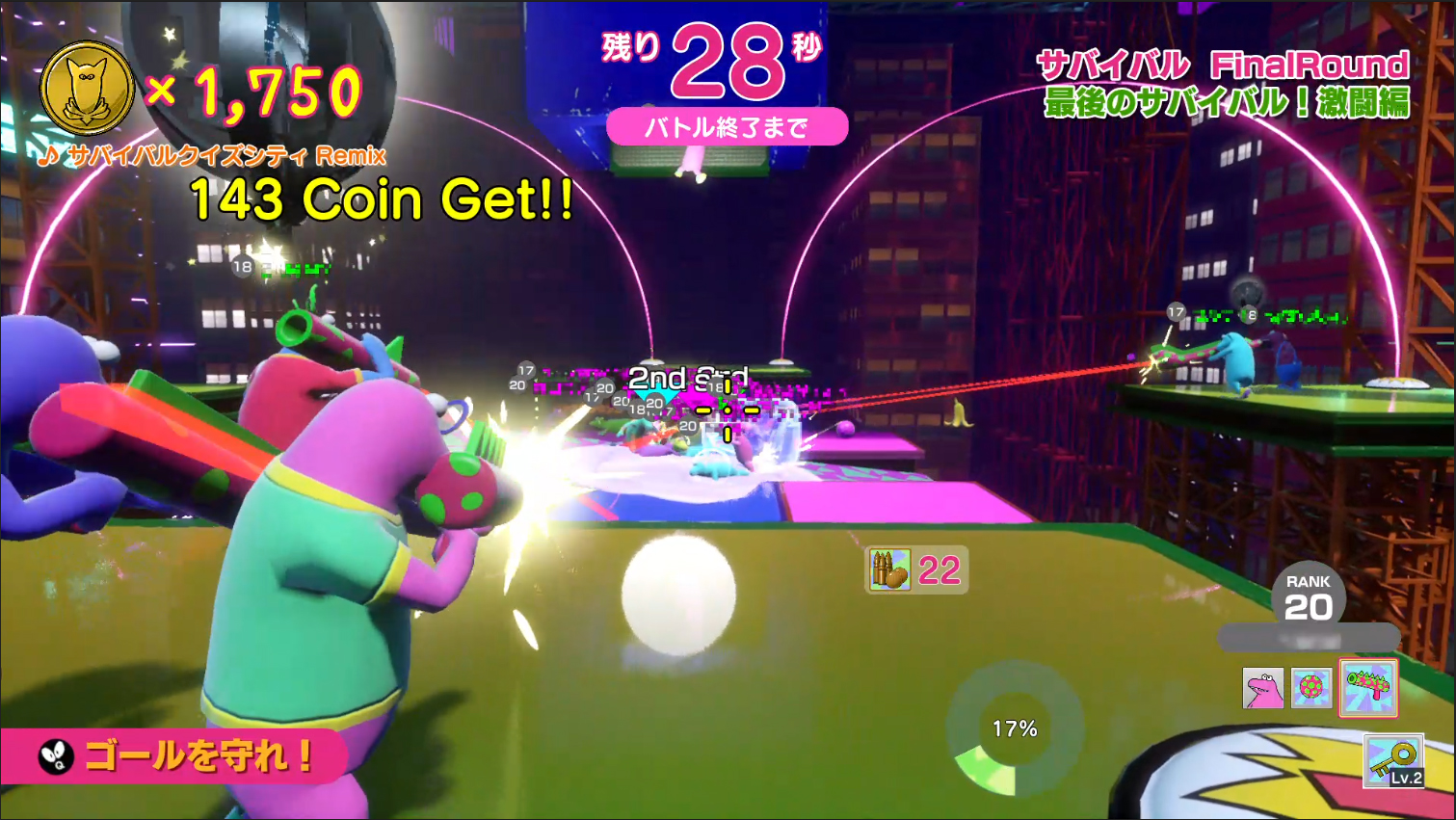
Like “going on a journey in a small car,” experiencing the entire process from development to launch in a short period of time helped the developers raise their skill levels.
―― Develop the game, release it, and then get feedback from players. It has long been pointed out that experiencing this sequence of events helps developers improve their skills. On the other hand, game development has become increasingly large-scale, and it takes a long time to experience this cycle. Survival Quiz CITY had a relatively short timeline from development to feedback, do you feel that your skills have improved?
●Shigeta: I think I have grown tremendously. Until now, I have only worked on specific parts of the development process, but with Survival Quiz CITY, I was able to experience everything from start to finish. Since the team is small, each of us has to do a variety of things. In my case, I was involved in many tasks, from game design to level design, action coordination, and overall project management. I think this was possible because of GYAAR Studio’s small scale. I was able to experience various failures and see the failures of team members from different positions. I think this experience will be very useful going forward.
●Sawada: I was able to experience localization as well as manage the structure of the Steam page, which the publishers have handled up until now. The translation part was especially difficult because it was a quiz game and there were 50,000 lines of text, but I think I was able to improve my skills by experiencing it for myself.
●Watanabe: I think the big thing was that we were able to create an online game for that 30 players can connect to simultaneously with only a small number of developers. I thought that alone would take ten engineers, but we were able to do it with only four. This gave us confidence in our technical skills.
It was also incredible to see Shigeta-san build the game mechanics from scratch to come up with a solution. He incorporated various ideas into the implementation, tested and improved them, and created something very fun while staying loyal to the concept of the game. It’s rare to be able to witness something like this, and I think I will be able to apply this process to the games I’ll work on in the future.
●Matsumaru: Up until now, I’ve mainly worked on large-scale projects where the specifications were finalized before they’re implemented. However, with Survival Quiz CITY, we went through the cycle of creating the game first, seeing how players respond, and then deciding what to do next based on the feedback.
We also worked with Phoenixx, our publisher, and discussed our marketing strategies. Although I’m an engineer, it was a valuable opportunity for me to focus on how to present and sell the game as a product. At the same time, I was reminded of the magnitude of what Bandai Namco Entertainment does for us engineers.
●Shigeta: It’s quite a feat to sell 100,000 or 200,000 units.
●Ando: I’m very glad that I was able to play a part in building the system that GYAAR Studio now has, where games are released games in a relatively fast cycle. At Bandai Namco Studios, we create small-scale games as part of the new hire training and part of the Survival Quiz CITY blueprint is being applied to this process.
●Tanaka: I was able to experience the entire process of creating and releasing a game, and because it was a small-scale project, I was able to do a lot of different things and learn a lot. I also appreciated the opportunity to see what other professionals were doing up close.
●Yano: We were able to strengthen our sound development process through a series of trial-and-error, including concept building, sound demo creation, and more efficient debugging. We learned how to present our requests to composers in order to get them motivated and eager to work on our project. It was also amazing to be able to understand the hardships faced by those in different positions, the actual extent of what they do, and to be able to empathize with them as we worked together. Although creating something from scratch was difficult, we were all able to combine our efforts together in a very cheerful atmosphere.

●Ando: It was fun (laughs).
●Watanabe: We were like college kids, kind of like a doujin circle.
●Yano: Like a school festival (laughs).
●Tanaka: That’s right. Some players even said that they wanted to support the project because the team seemed to have a lot of fun making it.
●Shigeta: The small number of people on the team made it easy to make small trips. If I were to use a travel analogy, a big project is a package tour in a sightseeing bus, and this one was like driving a small car by ourselves, making stops along the way, and driving on rough roads without even using the highways, to get to our destination.
Through developing this game, I’ve gained a great deal of valuable experience. I would like to put this experience to good use in my future development work.
――Thank you very much!
(Author: Shinichi Yamoto)
Official Site
https://store.steampowered.com/app/1466930/Survival_Quiz_CITY/
*All company and product names mentioned herein are trademarks or registered trademarks of their respective companies.
(*1)©2022 Valve Corporation. Steam and the Steam logo is a trademark or registered trademark of Valve Corporation in the United States and/or other countries.
Survival Quiz CITY
©Bandai Namco Studios Inc. Published by Phoenixx Inc.




